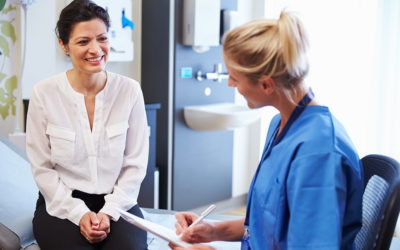Obesity in the United States is increasing at an alarming rate and is a primary cause of our country’s current health crisis. More than 40% of Americans are now obese, rising from 23% in 1990. Many times the terms “overweight” and “obese” seem interchangeable....
Expert Health Tips
Take advantage of their expertise in areas that interest you with our blogs, podcasts and health emails. And if you need a doctor, we can help with that too!
Recent Posts From Our Health Experts
When Should You Start Screening for Colon Cancer? 50? 45? Never?!
When Should You Start Screening for Colon Cancer? 50? 45? Never?! If you answered 45 – good for you! Most people don’t realize that the recommended age by the American Cancer Society (ACS) to begin these screenings has been lowered from 50 to 45—and sooner if you have...
How Healthy Is My Heart?
I fell in my home. It was in the afternoon on a very cold day. I was watching TV, keeping occupied inside instead of braving the cold and walking outdoors. As is known to happen to grandmas, I had the urgent need to use the bathroom. You’ve seen the commercials, so...
Beating the Winter Blues
I’ll admit, winter has never been my favorite season. I would gladly trade cold weather, less sunlight and getting sick more often for sunny days at the beach. The “winter blues” is a common term used to describe the increased sadness, lower energy and reduced...
Grieving During the Holidays
The grief bubbles up unbidden. I never know when or where it will surface, but inevitably it comes when I least want it. My mom contracted COVID-19 six months ago. She nearly died of complications from the virus. The anticipatory grief I experienced was different from...
Foolish Mistakes, Calculated Risks and Taking a Leap of Faith
Growing up, I made my share of foolish mistakes. As a kid, I remember being on a skateboard and holding on to a rope tied to a bike that a friend was riding. We got going pretty fast, and then I fell face forward on the pavement. My face was OK, but I skinned up my...
Mindful Eating vs. Emotional Eating: 6 Steps for Success
What is emotional eating? Emotional eating is generally when we eat as a way to suppress or soothe negative emotions such as stress, anger, fear, boredom, sadness and loneliness. When we work to reduce emotional eating, it is important to be aware of behaviors we can...
8 Great Reasons to Try Acupuncture
Over my 19 years of practicing complementary medicine, since earning a master’s degree in Oriental Medicine, the most common question I hear from people is: “Will acupuncture treat my _________?” Fill in the blank. About 90% of the time the answer is YES! Acupuncture...
How to Break a Sugar Habit
Have you ever wondered why once you eat something sweet, you keep craving more sugar? It’s not a coincidence; sugar addiction is real! If sweets are getting in your way of achieving your health goals, you CAN break the habit! In today’s society, we eat ‘dessert’...
What Can I Do to Improve My Sleep?
Do any of these scenarios sound familiar? It’s Sunday afternoon and while sitting in my recliner watching television, I end up taking a nap over two hours. Why am I not able to fall asleep at my normal bedtime hour? I had to work late and ended up eating later than...
Should I Take Aspirin to Prevent a Heart Attack?
There’s been a hot and cold romance with the daily use of aspirin to prevent heart attacks and other conditions for years. On one hand, it’s been shown to reduce the risk of a stroke or heart attack. On the other hand, it’s been shown to increase the risk of bleeding,...
Women Don’t Talk About It But They Should Know About It: Gynecological Cancer
Compared to other cancers gynecologic cancer is relatively rare, but it is still important for women to know about it and take action for prevention and treatment. Some forms of it can be prevented by taking simple steps. Others have no preventative measures and...
Tune in to…Bryan Health Radio
Want to know more about a health topic, or tips to stay well? Our 10-minute podcasts provide practical, useful advice for a lifetime of good health. And, they’re easy to listen to while you’re on the go, at work or at home. Get valuable health information from doctors and health experts. Listen to or download a free podcast today!
Stay Informed For Your Health
You and your family are unique. At Bryan Health, we have a variety of classes, events, podcasts and more for all stages of life.
To stay in the know, subscribe to our monthly For Your Health email!
Concerned About Health Symptoms, and Unsure What to Do? Use our Symptom Checker and find out.
Whether it’s a rash, your child’s ear pain or your aching back, our symptom checker can help determine what to do. Just answer a few questions about your symptoms and receive recommendations for care.
Care When You Need It
Getting sick or hurt is never convenient. From minor illnesses and injuries to serious health conditions, turn to Bryan. We provide the expertise and care you need. Choose from our online Bryan Health ezVisit to Bryan Urgent Care walk-in clinic to three emergency rooms ready to help you.













